 |
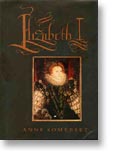 |
ELIZABETH I ,
by Anne Somerset (Alfred A. Knopf, 1991, $30.00)
This is the best single-volume biography of which I am aware of one of the most remarkable people in world history. Elizabeth I was every inch a 16th-century monarch, one who used to the fullest the tools at her disposal-her first-rate education, her more-than-first-rate mind, her immense talent for politics, and, by no means least, her femininity-to become first a legend in her own lifetime and, ever since, as close to immortal as this world allows. Anne Somerset, a fine writer as well as a fine historian, tells the story of that life to perfection, never forgetting that while Elizabeth was a queen she was also very much a human being. She fills in with great skill the necessary cultural and political background and sketches fully, but not too fully, such ancillary characters as William Cecil, the Earl of Leicester, Sir Francis Drake, and King Philip II who found themselves, willingly or unwillingly, to be planets orbiting the sun that was Queen Elizabeth I of England. On finishing this book, I thought of what Bismarck said after withdrawing from an audience with Queen Victoria: "Mein Gott, what a woman!"
Rating: A+
|
 |
|
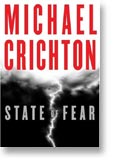 |
STATE OF FEAR ,
by Michael Crichton (HarperCollins, 2004, $27.95)
State of Fear is, as you would expect from a master of the thriller, a page-turning read. The main character comes within inches of being murdered three times, each in a way more interesting than the last: being lured into falling down a crevasse in Antarctica, being attacked by lightning attracted by a planted lightning attractor (if you were not afraid of thunderstorms before, you will be after reading this chapter), and being bitten by a small but deadly octopus. What makes the book even more interesting is that what are usually sacred-cow good guys-the environmental movement and its leaders-are here the bad guys. Crichton demonstrates (complete with footnotes and bibliography-in a thriller!) How shaky are the evidentiary underpinnings of much of what they claim and advocate. Crichton makes wicked fun of nitwit do-gooder Hollywood types who call for conserving resources while driving Hummers and living in 12,000-square-foot houses. The book is both an engrossing example of escapist fiction and a short but quite serious course in environmental science and its frequent political perversion. That, when you come to think of it, is a pretty neat literary trick. The movie, if it's done right, will be terrific.
Rating: A
|
 |
|
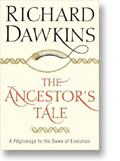 |
THE ANCESTOR’S TALE: a Pilgrimage to the Dawn of Evolution ,
by Richard Dawkins (Houghton Mifflin, 2004, $28.00)
Dawkins is one of the world’s great biologists and writes better and more clearly about evolution than anyone I have ever encountered. His ability to bring very complex and subtle matters to vivid clarity for the non-scientist is nothing less than awesome. The conceit of this book is to look at the history of life backwards, from modern humans to the very beginning, as though the various forms were like the pilgrims in The Canterbury Tales, joining together as they walk down the road towards Canterbury. Thus the book is a series of joinings, first humans joining with the great apes, then the lesser apes, then monkeys, and so on. Each confluence gives Dawkins the opportunity to discuss a vast range of biological issues, each more fascinating and enlightening than the last. Unfortunately, Dawkins occasionally drags in his political views, offering gratuitous and often sophomoric insults to President Bush (making fun of his pronunciation—a standard American one—of "nuclear," for instance) and American foreign policy. It’s like the manuscript was stolen by Michael Moore, who then added a few paragraphs of his usual tendentious twaddle. Professor Dawkins’s editor or agent should have sat him down and stopped this auto-graffiti on what is otherwise a masterpiece.
Rating: A+ for biology, F for the irrelevant politics.
|
 |
|
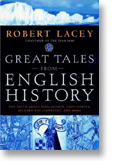 |
GREAT TALES FROM ENGLISH HISTORY: The Truth About King Arthur, Lady Godiva, Richard the Lionheart, and More ,
by Robert Lacey (Little, Brown, 2003, $22.95)
A slight book that devotes only a few pages to each of these tales, which range from the Cheddar Man (ca. 7150 B.C.)in earliest neolithic Britain to the Peasants' Revolt in 1381, which marked the beginning of the end of the Middle Ages. But while slight, the tales are well written and historically scrupulous. They also come with worthwhile bibliographies, making them a good place to start research in more depth. And they are, indeed, great tales, tales that have passed into the folk-memory and literature of the English-speaking peoples.
Rating: B
|
 |
|
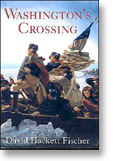 |
WASHINGTON'S CROSSING ,
By David Hackett Fischer (Oxford University Press, 2004, $35.00)
A brilliant book, this is history writing at its absolute best. One of the Pivotal Moments in American History series, this account of the early days of the American Revolution brings those desperate days alive as few books do. Centered on the character and actions of George Washington, it shows clearly why, if he was not a great general, he was a very great leader. He held the Continental Army together as it retreated across New Jersey, losing ninety percent of its strength and then, on Christmas night in the teeth of a noreaster, struck back, killing or capturing nearly a thousand Hessian soldiers. In the next three months, Washington reversed the military situation in New Jersey, becoming the hunter rather than the hunted, and forced the British army back to New York. The Republic was saved, and the next summer would bring the great victory at Saratoga and French and Dutch aid.
Rating: A+
|
 |
|
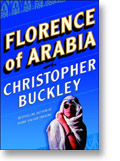 |
FLORENCE OF ARABIA ,
By Christopher Buckley (Random House, 2004, $24.95)
Another novel by Chris Buckley that should not be read in a public place, such as an airplane, unless you don't mind people staring at you as you are helpless with mirth. Buckley is a master of telling the truth with satire and this tale of a young woman, with shadowy help from the U.S. government, trying to help women in the Middle East throw off the shackles of the medieval social system shows exactly why. Funny and touching as well as exciting, it would make a fabulous movie if anyone in Hollywood had the guts to make it, which is doubtful.
Rating: A-
|
 |
|
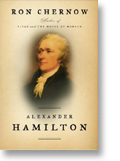 |
ALEXANDER HAMILTON ,
By Ron Chernow (The Penguin Press, 2004, $35.00)
One of the best biographies of recent years, period, it brings the driven, brilliant, Hamilton and the world he lived in to vivid life. With a claim to the title of Founding Father that only Washington, Jefferson, and Madison can equal, Hamilton has often been unfairly neglected by intellectuals, who have found his unabashed commercialism unsettling if not downright offensive. But Hamilton's mastery of the arcane and intricate details of public finance transformed the new United States from a financial basket case to having the best credit in the western world in just a few years. It was a dazzling achievement, made even more dazzling by the ferocious political opposition of Jefferson and his followers that had to be overcome. Chernow's public Hamilton is fully, and masterfully, portrayed. But so is the private Hamilton, who is far less well known.
Rating: A+
|
 |
|
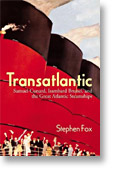 |
TRANSATLANTIC:
Samuel Cunard, Isambard Brunel, and the Great Atlantic
Steamships ,
by Stephen Fox (New York: HarperCollins , 2003,
$29.95)
Transatlantic is as much concerned with the
ships themselves and the technology and men who made them possible as
with the social doings of
those who traveled on them first class. This makes it immensely satisfying
reading for those who love the nineteenth century and its extraordinary
achievements in science, engineering, and business. In 1800 there was
no such thing as a passenger ship or regularly scheduled travel across
the Atlantic. Ships would carry a few passengers in addition to cargo,
sail when convenient for the captain, and often take six weeks to cross the ocean
eastward, eight to ten westward. By 1900 steel-hulled leviathans weighing thousands
of tons carried a thousand passengers across the ocean in a week. The story of
that immense transition is the story Stephen Fox tells, and he tells
it very, very well.
Rating: A
|
 |
|
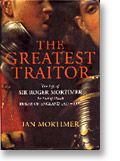 |
THE
GREATEST TRAITOR: the Life of Sir Roger Mortimer
1st Earl of March, Ruler of England 1327-1330 ,
by Ian Mortimer (London: Jonathan Cape, 2003 £17.99)
The first complete biography of Roger Mortimer, Lord Mortimer of Wigmore,
a fair-to-middling baron in the Welsh Marches in the early 14th century.
A capable administrator and general, Mortimer served his king, Edward
II, well. But when Edward fell under the malign influence of Hugh Dispenser
the Younger, a rapacious and unprincipled upstart, and would deny him
nothing, Mortimer sided with his class—the other barons—not
his king. Clapped in the Tower, he managed to escape to France where he
began an affair
with Edward’s Queen, Isabella, daughter of the French king and known to
history as “the she-wolf of France.” Together they invaded England
in 1327, deposed the hapless Edward, and put his 15-year-old son, Edward III,
on the throne. But Mortimer then ran the country as a tyrant until Edward
III
staged a coup-d’état in 1330, hanged Mortimer, and assumed personal
rule. Well written and engrossing, the author clearly knows his way around the
high
Middle Ages and its bloody, often Mafia-like ways. But his theory that Mortimer
only staged Edward II’s death, not long after his deposition, and did not
actually carry it out (allegedly by having a red hot poker thrust into his bowels
so as to leave no mark), is wholly unconvincing. Still, well worth the time of
anyone interested in the period.
Rating: B-
|
 |
|
 |
THE
SECRET VOYAGE OF SIR FRANCIS DRAKE, 1577-1580 ,
by Samuel Bawlf (New York: Walker & Co., 2003
$28.00)
Swashbuckling at its very best. The epic voyage of Sir Francis Drake
around the world has just about everything one could want and it’s
especially gratifying to find it in a book of sound scholarship. Drake
was the first European to command a circumnavigation of the globe after
Magellan (and, unlike Magellan, lived to tell the tale). He dealt with
storms, mutiny, hunger, illness, hostile natives, and a dozen other perils
of the sea. He also captured a fortune in treasure and gave the Spanish,
completely blind-sided by his sudden appearance in the pacific, fits. “El
Dreque” is a phrase to reckon with in Spanish America even to this
day.
The author deals extensively with the mystery of exactly where Drake landed on
the North American Pacific coast while searching for the North West Passage.
Practically every cove and inlet north of San Diego claims the honor, but the
author makes the case, and a good one, for Vancouver Island.
Rating: A
|
 |
|
|
|



